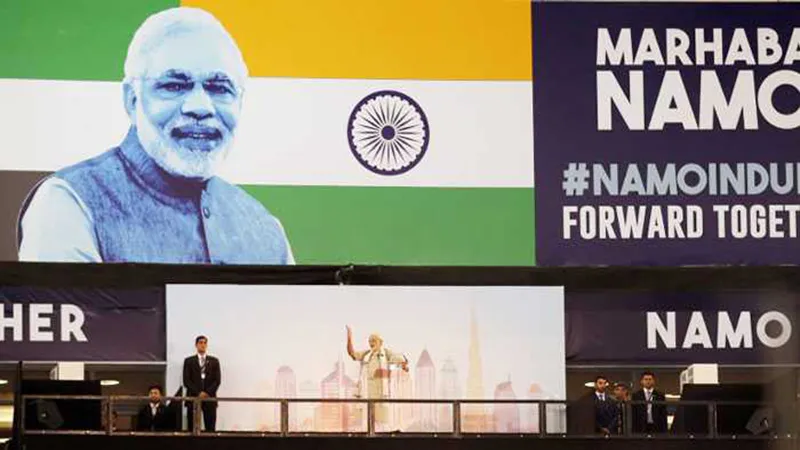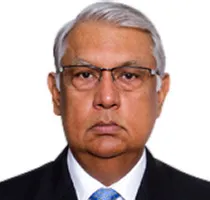-
CENTRES
Progammes & Centres
Location

Prime Minister Narendra Modi's visit to the United Arab Emirates (UAE) was his first attempt at engaging the Arab world in India's near West.
The joint statement issued captures the sentiment in its opening para: ""The visit of an Indian Prime Minister to UAE after 34 years marks the beginning of a new and comprehensive strategic partnership between India and UAE in a world of multiple transitions and changing opportunities and challenges.""
The West Asia plan
This initiative comes after Modi's 'neighbourhood first' policy, engagement with big powers, Central Asian nations and 'Act East' policy.
His visit to the UAE, one of the important Gulf Cooperation Council (GCC) countries, is set to test India's diplomatic skills in the region. Modi has picked up the gauntlet, in so far as balancing India's interests are concerned.
India's relations with the countries of West Asia can be understood as a triangle, with Iran, Israel and the GCC countries (Saudi Arabia, UAE, Oman, Kuwait, Qatar, Bahrain) forming the three angles. India enjoys good relations with all of them and has built up considerable stakes in these countries.
This outreach to Arab Muslim countries will not go unnoticed within India either and in the broader region of South Asia. The UAE visit is the first step in a comprehensive plan of engagement with the region, which sees strained relations between the three angles of the triangle.
Turmoil in the region
Modi's visit to the UAE comes at a time when several countries in West Asia are afflicted by turmoil. The GCC countries, though, are relatively stable.
The winds of change that swept several governments out of power in Tunisia, Egypt and Libya did effect the GCC countries, but the ruling families managed to maintain stability.
However, Syria and Yemen are embroiled in civil war. The instability in these countries is causing horrific humanitarian consequences.
The Islamic State, operating in parts of Iraq and Syria, is casting an evil shadow over the region and beyond. The brutality of the Islamic State, its gleeful and menacing publicity of human slaughter over social media, has set new benchmarks of degrading human behaviour.
In contrast, the pragmatic and moderate leadership of the UAE has steered the country as the fastest growing economy in the Arab world, drawing admiration and praise from Modi.
Why UAE is crucial
India's interests in the GCC countries are intimately tied up with its energy security, trade, employment for Indians and remittances.
The UAE hosts over 2.5 million Indians, the bulk of whom are blue-collar workers. The stability of their jobs contributes to the welfare of their families back home. The UAE has emerged as India's second-largest trading partner and an important source of remittance.
The stability and security of the GCC countries is crucial for India. In his interview to Khaleej Times prior to the visit, Modi described the UAE as a ""mini India"", a theme he picked up again in his rousing speech to Indian citizens and others in Dubai.
Clearly, one priority for India is investments from countries like the UAE, which have substantial sovereign wealth funds for investment. This was reflected in the joint statement, with the announcement of an investment fund worth Rs 4.5 lakh crore, for infrastructure development in India.
The terrorism angle
Another important objective is the continuing fight against terrorism and allied criminal activities like money laundering. Both aspects found mention in the joint statement, which denounces and opposes terrorism in all forms and manifestations.
The statement calls on all states to reject and abandon the use of terrorism against other countries, no matter where and by whom it is committed, dismantle terrorism infrastructure where it exists, and bring perpetrators of terrorism to justice.
In his public speech Modi emphasised this point, making the same oblique reference to Pakistan without mentioning it by name.
In this respect, the announcement of bumping up the bilateral relationship with the UAE to a comprehensive strategic partnership is a major move.
The joint statement lays out numerous platforms for cooperation in countering radicalism, misuse of religion to incite hatred, and perpetuating and justifying terrorism for political aims.
For the first time, bilateral cooperation will extend to counter-terrorism operations, intelligence sharing and capacity building.
The agreement to establish a dialogue between the two National Security Advisers and the respective National Security Councils and other security cooperation mechanisms underline the growing security relationship between the two countries.
This cooperation will encompass cyber security, maritime security, inter-operability and collaboration for mitigating humanitarian and natural disasters in conflict zones. The two countries have also agreed to conduct joint defence exercises and enter into joint ventures for the manufacture of defence equipment.
Filling a void left by the US
The joint statement reflects a major leap of faith for the UAE. The Islamic pull factor had given Pakistan an advantage in the early evolution of relations between them.
Rich sheikhs hunted the endangered bird, the Great Indian Bustard, in the deserts of Sind. Criminal gangs from India operated out of the UAE and escaped to Pakistan with the connivance of the UAE security authorities. Even wanted terrorists like Dawood Ibrahim and his cohorts found refuge in the UAE in the past.
Pakistan had also cashed in its early advantage of flying UAE air force aircraft and training their pilots. That era of coziness may be ending to some degree as Pakistan struggles with its proliferating domestic problems and an anaemic economy.
India's energy and economic security is intimately intertwined with the GCC countries. It is, therefore, logical that in the security domain, India should step up cooperation with the UAE.
This will be a new and significant initiative as the USA, the primary security provider to the GCC countries, disengages from the region or reduces its profile. The USA is now self-sufficient in oil and gas, and its energy security has been unshackled from sources in the region.
For India, its future energy security will remain intimately tied up with energy suppliers in the region. Hence, protecting energy supplies will remain one of the highest foreign policy priorities for India.
The Indian Navy's role in anti-piracy operations to protect the Sea Lanes of Communication (SLOC) is already well known. Greater security and defence cooperation with the UAE will, therefore, enhance India's security role in the region. As India and the USA also enhance their security and defence ties, certain synergies in this domain are emerging.
The GCC and other countries also accept that India's relations with Iran and Israel will follow independent trajectories, not necessarily impeding or impinging on India's relations with them.
Modi's visit opens various doors for closer engagement with this region, at a time of significant global geo-strategic shifts.
Courtesy: Catch News
The views expressed above belong to the author(s). ORF research and analyses now available on Telegram! Click here to access our curated content — blogs, longforms and interviews.

Pinak Chakravarty was a Visiting Fellow with ORF's Regional Studies Initiative where he oversees the West Asia Initiative Bangladesh and selected ASEAN-related issues. He joined ...
Read More +